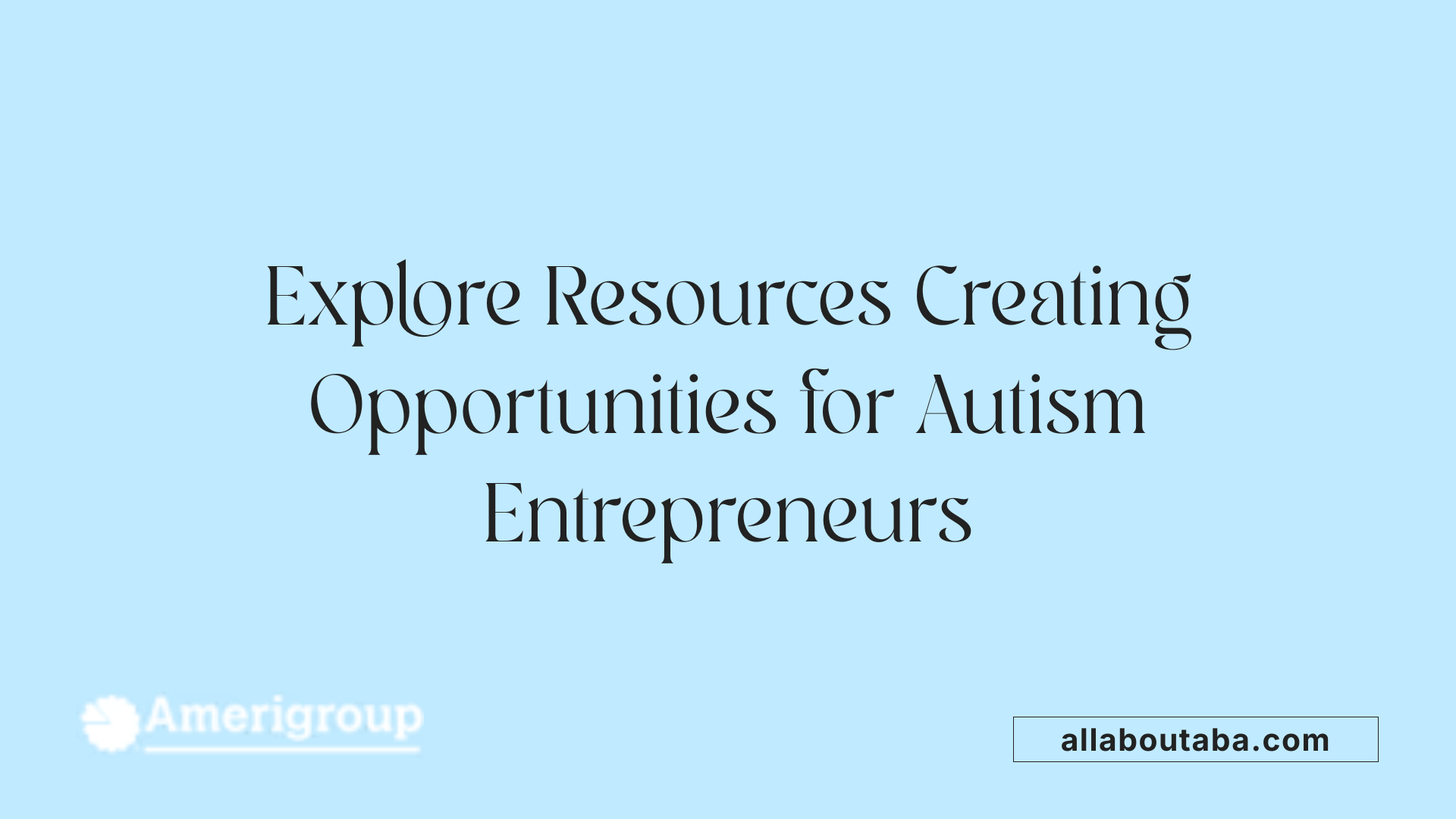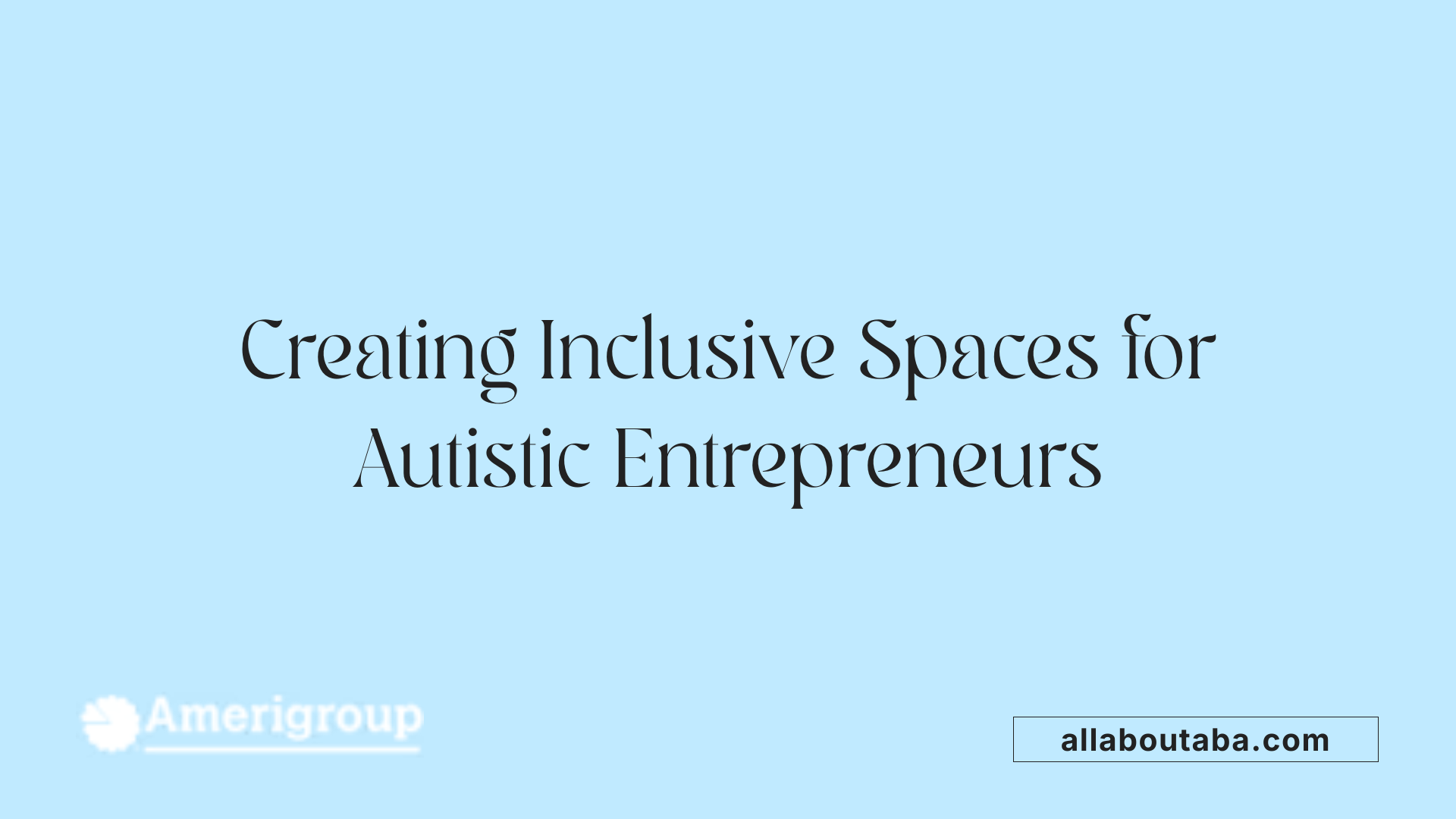Understanding and Elevating Autism-Owned Businesses
Supporting autistic entrepreneurs requires a nuanced approach that recognizes their unique strengths and challenges. By understanding their capabilities, providing tailored resources, and promoting inclusive environments, we can foster sustainable growth and innovation within the neurodiverse business community. This article explores best practices, resources, routines, advocacy strategies, and success stories that highlight effective ways to support autism-driven ventures, ultimately advancing inclusion and economic independence.
Leveraging Strengths and Tailored Support Strategies

What are some best practices for supporting autistic entrepreneurs?
Supporting autistic entrepreneurs involves a nuanced understanding of their unique qualities and challenges. Recognizing their natural strengths, such as creativity, high attention to detail, and profound empathy, is fundamental in fostering their business success.
Creating customized support systems is also essential. This can include developing personalized business plans that outline clear goals and manageable steps, tailored to individual capacities and interests. Many autistic entrepreneurs benefit from structured routines and predictable schedules, which can be effectively managed with tools like Google Calendar or Notion. These routines help maintain focus and reduce stress, particularly when planning around fluctuating energy levels.
Implementing supportive accommodations is another crucial practice. Sensory-friendly workspace adjustments, flexible communication methods like written updates, and inclusive meeting setups can make a significant difference. Additionally, leveraging financial management tools such as QuickBooks and Wave, and seeking guidance from knowledgeable accountants, enhances financial organization.
Building a robust support network—comprising mentors, peer groups, and local small business development centers—boosts confidence and provides ongoing encouragement. Encouraging self-advocacy by explaining sensory needs and communication preferences ensures smoother operations and inclusivity.
Incorporating automation for repetitive tasks and promoting clear boundaries helps prevent overwhelm and burnout. Overall, fostering an environment that validates neurodiversity, supports individual strengths, and provides appropriate resources paves the way for autistic entrepreneurs to thrive in their ventures.
Understanding the Needs and Strengths of Autistic Entrepreneurs
How can understanding the strengths and needs of autistic entrepreneurs enhance support strategies?
Recognizing the unique qualities of autistic entrepreneurs allows supporters and organizations to create tailored approaches that boost their success. Autistic entrepreneurs often possess remarkable skills such as deep focus, creativity, attention to detail, and high levels of empathy. These strengths can give them a competitive edge in fields like content creation, graphic design, software development, and consulting.
At the same time, understanding their challenges — including sensory sensitivities and social communication differences — is vital. Sensory sensitivities can make environments with bright lights, loud sounds, or unpredictable stimuli overwhelming. Communication preferences may lean towards written methods like email or text rather than frequent phone calls.
Support strategies benefit from this awareness by emphasizing personalized business plans, accessible funding opportunities, and connections with mentors familiar with neurodiverse needs. For example, encouraging the use of assistive tools like noise-canceling headphones or scheduling routines can help manage sensory overloads. Facilitating access to resources such as grants and small business loans designed for autistic entrepreneurs further empowers them.
Creating an environment that promotes independence involves designing accommodations and routines aligning with their strengths and limitations. This might include structured schedules, clear boundaries for work and rest, or sensory-friendly spaces. When supporters understand these aspects, they can help autistic entrepreneurs build confidence, manage stress, and navigate entrepreneurship more effectively.
Ultimately, appreciating what makes autistic entrepreneurs uniquely capable and aware of their challenges fosters support systems that enhance their ability to thrive. This empathetic, individualized approach not only improves business outcomes but also advances greater inclusion and economic self-sufficiency within the autism community.
| Aspect | Strengths or Challenges | Support Strategies |
|---|---|---|
| Deep Focus | Enables high-quality, detail-oriented work | Schedule focused work periods; use time management tools |
| Creativity | Drives innovation and unique brand ideas | Encourage creative outlets and flexible routines |
| Empathy | Fosters strong customer relationships | Develop communication preferences; use written communication |
| Sensory Sensitivities | Overwhelm in certain environments | Create sensory-friendly workspaces; use noise-canceling devices |
| Social Communication | Difficulties in traditional settings | Use written, visual, or digital communication tools |
| Energy Fluctuations | Variability in focus and energy levels | Allow flexible scheduling; choose tasks matching energy levels |
Understanding and supporting autistic entrepreneurs through these lenses enhances their capacity to succeed while honoring their individual needs. Developing tailored strategies aligned with their innate strengths and sensory profiles helps them leverage their full potential in the business world.
Resources and Guides Supporting Autism-Owned Businesses

What resources and guides are available to support autism-owned businesses?
Autism entrepreneurs benefit from a variety of resources designed to promote business success and community integration. One prominent resource is directories that list autism-owned or operated businesses. For example, organizations like Autism Speaks offer directories that help consumers and partners find and support these businesses, fostering a network of empowerment and visibility.
Mentorship and business development programs specifically tailored for neurodiverse entrepreneurs are vital. These programs often provide mentorship, training, and strategic planning guidance, helping entrepreneurs leverage their strengths and navigate challenges.
Funding remains a crucial component of starting and growing a business. Options include grants, small business loans, and special savings accounts such as PASS — Public Asset Sale Savings — which do not affect SSI benefits. Organizations like NeuroNav in California offer Person-Centered Plans that assist with financial support, enabling entrepreneurs to access necessary resources.
Support from advocacy groups enhances opportunities for networking and growth. Groups like the Autism Society and community-based events connect autistic entrepreneurs with peers, mentors, and business opportunities. Community organizations like the Small Business Development Centers (SBDCs) provide training, consulting, and resources tailored to support business sustainability.
In addition to direct support, educational resources such as guides on business development and marketing strategies help entrepreneurs understand how to grow their ventures effectively. Overall, a collaborative network of government agencies, non-profit organizations, and community groups offers a comprehensive support system for autism entrepreneurs to thrive.
| Resource Type | Examples | Main Focus | How It Supports Entrepreneurs |
|---|---|---|---|
| Business Directories | Autism Speaks Directory | Visibility & Networking | Identifies autism-owned businesses for customers and partners |
| Mentorship Programs | Neurodiverse Entrepreneur Incubators | Business Growth | Provides tailored mentorship and training |
| Funding Options | PASS, Grants, Loans | Financial Support | Offers financial resources without jeopardizing benefits |
| Advocacy & Community | Autism Society, SBDCs | Community Building & Resources | Facilitates networking, training, and advocacy |
This integrated array of resources supports autistic entrepreneurs in areas from funding to networking, helping them build sustainable and fulfilling businesses.
Implementing Autism-Friendly Routines and Accommodations

What are some autism-friendly routines and accommodations that can support autistic entrepreneurs?
Autistic entrepreneurs can greatly benefit from routines and accommodations tailored to their unique needs. Establishing a structured work schedule helps create predictability, reducing stress and anxiety associated with uncertainty. Using visual tools such as charts, calendars, and checklists makes it easier to plan and stay organized.
Creating sensory-friendly workspaces is essential. This can include adjustable lighting, noise-canceling headphones, and designated quiet areas to help manage sensory sensitivities. Incorporating sensory tools like fidget devices or calming lighting can further enhance focus and comfort.
Flexible arrangements, such as remote work options, allow entrepreneurs to adapt their environment according to their daily energy and focus levels. Clear, visual communication methods, like written instructions or visual cue cards, can reduce misunderstandings and streamline interactions.
Building a workplace culture that promotes understanding and acceptance involves training staff and fostering mentorship opportunities. Regular assessment of the environment and accommodations ensures ongoing support, allowing autistic entrepreneurs to thrive. By adopting these practices, entrepreneurs can create an inclusive, supportive business environment that maximizes their strengths and encourages success.
Sharing Personal Advocacy and Success Stories

What personal experiences and advocacy strategies do autistic entrepreneurs share to support others?
Autistic entrepreneurs often draw from their own journeys of self-discovery to inspire and support others in the community. Many share stories that highlight the importance of understanding their sensory, communication, and processing needs. For instance, Doug Blecher discusses how recognizing his autism was a turning point, enabling him to develop tailored strategies such as minimizing sensory overload and requesting accommodations at work. These adjustments not only helped him succeed professionally but also served as a source of inspiration for others.
Advocacy for neurodiversity and creating inclusive work environments is also a common theme among autistic entrepreneurs. They actively promote the idea that diverse minds contribute valuable perspectives and skills, emphasizing the need for businesses to adopt inclusive policies. Through storytelling, they highlight the benefits of recognizing individual strengths—such as deep focus, creativity, and attention to detail—and leveraging these qualities for business success.
Personal journeys of diagnosis and increased self-awareness, like those of Shannon Parris, further reinforce the importance of self-empowerment. Sharing experiences about seeking support, learning about autism, and advocating for necessary accommodations encourages others to pursue their entrepreneurial dreams with confidence.
Collectively, these stories and advocacy strategies serve as motivating examples. They demonstrate that embracing one's uniqueness and advocating for oneself can lead to meaningful achievements, helping others in the autism community navigate challenges and seize new opportunities.
Showcasing Success and Promoting Neurodiversity in Business
 Highlighting successful autistic-led businesses like Rising Tide Car Wash, Spectrum Designs, and Auticon plays a vital role in inspiring broader support for neurodiverse entrepreneurs.
Highlighting successful autistic-led businesses like Rising Tide Car Wash, Spectrum Designs, and Auticon plays a vital role in inspiring broader support for neurodiverse entrepreneurs.
These businesses serve as tangible examples that challenge stereotypes about autism and demonstrate the remarkable talents and capabilities within the autistic community.
For instance, Rising Tide Car Wash in Florida employs autistic individuals to run its operations, showcasing how inclusive employment can be both socially responsible and profitable.
Spectrum Designs, a social enterprise that employs autistic adults in a creative environment, exemplifies how leveraging unique strengths can lead to thriving, innovative businesses.
Auticon, a global IT consulting firm operated by and employing autistic professionals, illustrates how specialized skills such as attention to detail and deep focus can serve high-demand industries.
By sharing these success stories, entrepreneurs and advocates can change perceptions, showing that autism is associated with profound skills and that autistic-led enterprises can create significant social and economic impact.
Challenging stereotypes is crucial. These stories prove that autistic entrepreneurs are capable of leading innovative ventures and contributing meaningfully to the economy.
Supporting and investing in these businesses encourages societal acceptance and accessibility. It invites stakeholders—customers, investors, community leaders, and policymakers—to recognize the value of neurodiverse talent.
Such visibility fosters a culture where neurodiversity is celebrated, and a broader range of opportunities is created for autistic entrepreneurs.
Ultimately, showcasing these successes not only inspires other neurodiverse individuals to pursue their business ambitions but also encourages society to embrace diversity as a strength in the entrepreneurial landscape.
| Business Name | Industry | Notable Achievement | Impact |
|---|---|---|---|
| Rising Tide Car Wash | Automotive Service | Employs autistic individuals, demonstrating social impact | Boosts employment, challenges stereotypes, promotes inclusion |
| Spectrum Designs | Creative Enterprise | Employs autistic adults, combining creativity with social mission | Demonstrates that skills in arts can support sustainable income |
| Auticon | IT Consulting | Operates globally, emphasizing neurodiverse expertise | Advances understanding of specialized skills and D&I efforts |
Fostering awareness and support for autistic entrepreneurs is essential. Their success stories inspire societal change, promote inclusion, and demonstrate the value that neurodiverse talent brings to the business world.
Building an Inclusive Future for Autistic Entrepreneurs
Supporting autistic entrepreneurs involves a comprehensive approach that celebrates neurodiverse strengths, provides tailored resources, and cultivates inclusive environments. By implementing best practices such as structured routines, sensory accommodations, effective communication, and fostering strong networks, we can empower autistic individuals to succeed as entrepreneurs. Sharing success stories further breaks down stereotypes and inspires broader societal support. Promoting awareness and understanding of neurodivergence in entrepreneurial settings enhances not only individual outcomes but also contributes to a more diverse, innovative, and resilient economy. As communities and organizations commit to these principles, we can create a future where autistic entrepreneurs thrive and lead with their unique talents, enriching the world of business for everyone.
References
- 8 Tips for Starting Autism-Owned Businesses
- My FIVE Top Strategies For Autistic ADHD Entrepreneurs
- Success Tips for Entrepreneurs with Autism
- What We Can Learn From Autistic Entrepreneurs
- Honoring My Limitations as an Autistic Entrepreneur
- Autistic-Led Businesses
- 6 Steps to Autistic Entrepeneurship for Parents







